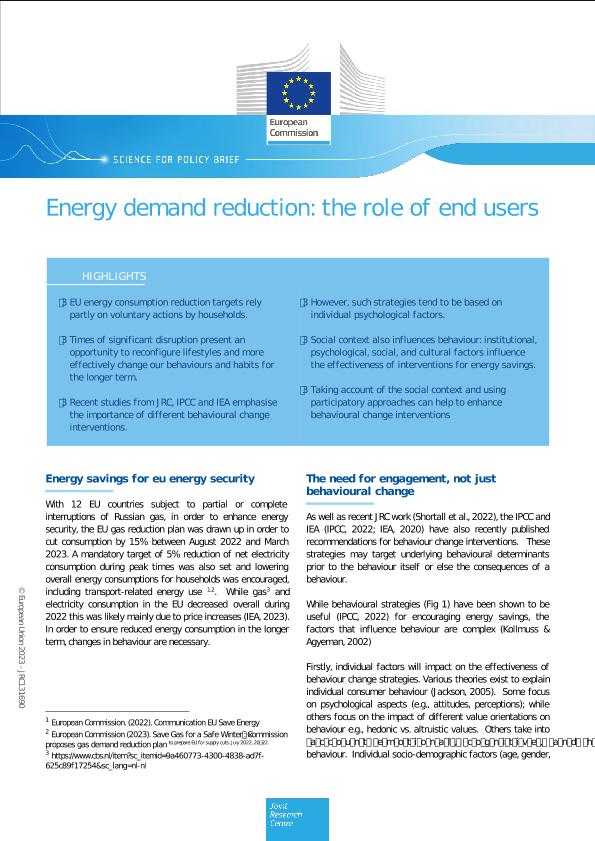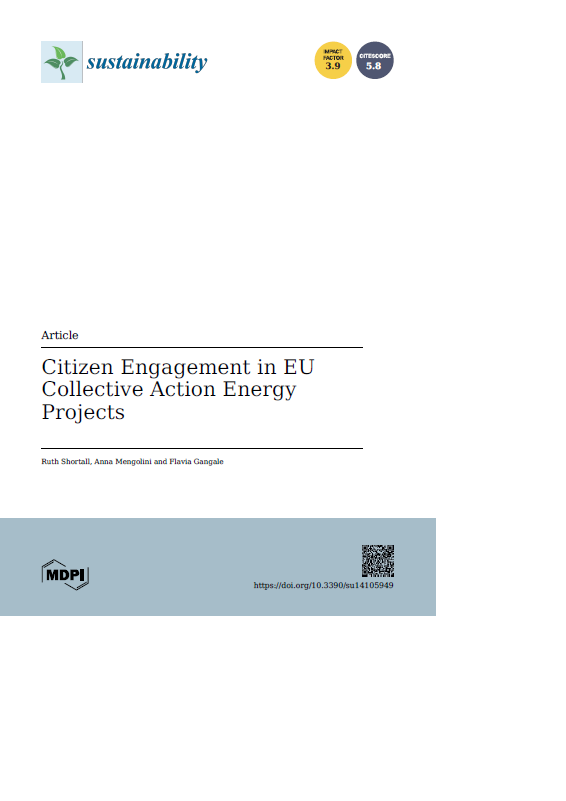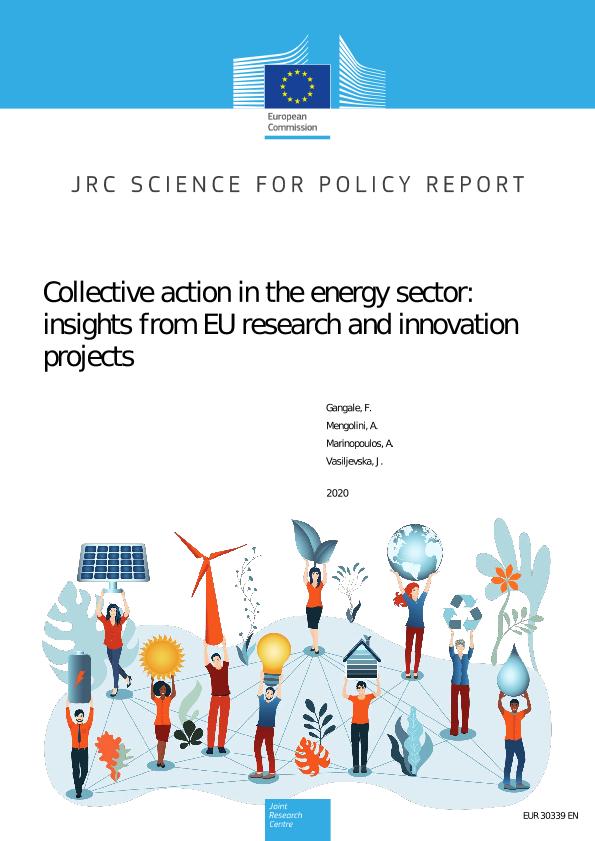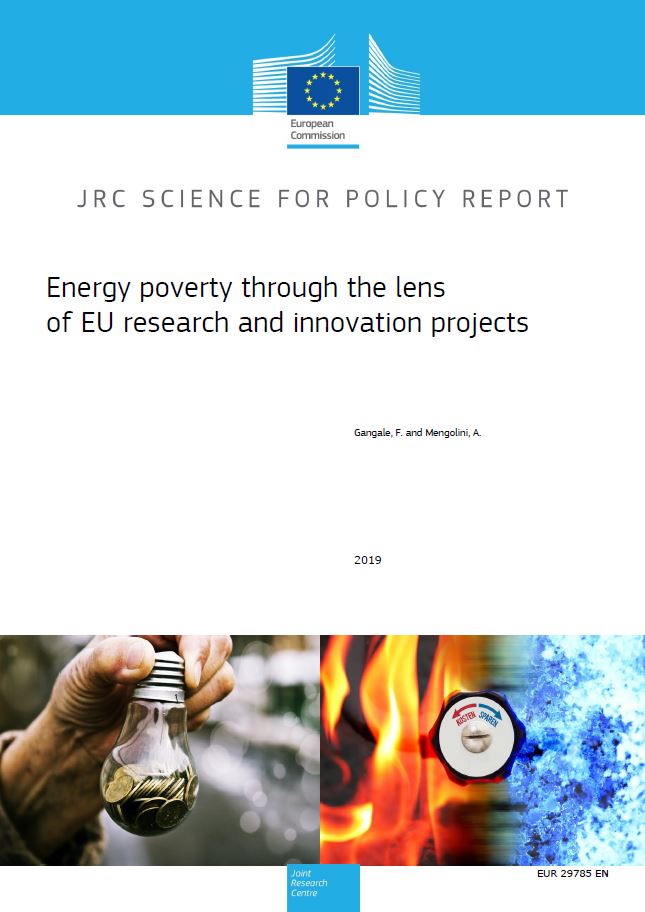Context and background
Energy poverty has become a widely recognised challenge in the EU. The breadth and seriousness of the problem has clearly attracted an extensive amount of scholarly attention and advocacy work, calling for urgent action at European and Member State level.
The search for innovative regulatory, technical and market solutions – such as anticipating the consumers' patterns and preferences or installing Advanced Metering Infrastructure – to change the way consumers perceive the electricity commodity is on the increase. However, many energy providers still need to further examine the best ways to present information on smart grids to the consumer, and to advance the development of social marketing strategies in which information is tailored to the needs, wants, and perceived barriers of individual segments of population.
The current smart grid engagement strategies strongly focus on the residential sector and distribution system operators take a leading role. Indeed, the latter are very interested in enhancing flexibility and improving the customers' responsiveness through energy efficiency projects or dynamic pricing (the price is adapted to real-time demand and supply) as they are faced with the challenge of integrating increasing shares of variable renewable energy sources into the electricity network, while at the same time ensuring the security of the system. As most of the obstacles to consumer engagement have to do with a high-level of consumer skepticism and wariness, the key to successful strategies for consumer engagement lies in building trust and confidence among consumers.
Our role and products
- We analyse collective action projects in the energy field, such as self-consumption initiatives and renewable/local energy communities. The objective is to provide an overview of the current state of play of relevant research and innovation activities in the EU and to identify the research gaps to be addressed in the future.
- We also aim to highlight the emerging trends in the efforts to tackle energy poverty in the EU, in order to contribute to the sharing of knowledge and best practices.
- Within the context of the Clear Energy Technology Observatory, we assess the techno-economic status and the potential supply chain criticalities of technologies that are fundamental to efficiently deploy the smart grid paradigm and enable consumers engagement (e.g., advanced metering infrastructure, EV smart chargers, home energy management systems).
Main publications

2024 - Energy demand reduction: the role of end users
With 12 EU countries subject to partial or complete interruptions of Russian gas, in order to enhance energy security, the EU gas reduction plan was drawn up in order to cut consumption by 15% between August and March. A mandatory target of 5% reduction of net electricity consumption during peak times was also set and lowering overall energy consumptions for households was encouraged, including transport-related energy use. While gas and electricity consumption in the EU decreased overall during 2022 this was likely mainly due to price increases. In order to ensure reduced energy consumption in the longer term, changes in behaviour are necessary.

2022 - Citizen Engagement in EU Collective Action Energy Projects
Transitioning to a low-carbon economy requires profound changes in the energy system, including digitisation and decentralisation. Collective action energy projects are a promising means of supporting this transformation since they redistribute control of energy resources to the citizens and foster sustainable energy behaviours, as well as potentially enhancing energy justice and democracy. The EU has funded a number of collective action energy R&I projects which combine the use of new technologies and community engagement. We identify 28 such projects and investigate the types of community engagement strategies trialed and the challenges they face. We find that engagement strategies comprise a mixture of shorter term participation and longer term behaviour change strategies. There is a tendency towards behaviour change strategies based on feedback and/or rewards, while other promising strategies like targeting group norms are less common. Overall, projects opt for medium-level participation, while co-creative or more empowering approaches are less common. A lack of consistency in approach and a lack of reported data on social impacts of the projects makes it difficult to determine how effective the engagement strategies (and hence projects themselves) have been. We provide some recommendations for designing and monitoring similar research projects going forward.

2020 - Collective action in the energy sector: insights from EU research and innovation projects
This report analyses EU-funded collective action projects in the energy field. The objective is to provide an overview of the current state of play of relevant research and innovation activities in the EU and to identify the research gaps to be addressed in the future. The report focuses on collective action projects that combine the use of new technologies, business models and community engagement approaches to support consumers in changing the way they use electricity. The analysis is also supported by an overview of projects that address the social dimension of the energy transition and promote the development of collective action initiatives at policy, institutional and societal level.

2019 - Energy poverty through the lens of EU Research & Innovation projects
Although the EU has not adopted a definition of energy poverty and energy vulnerable consumers, it has adopted a wide range of provisions to trigger and steer Member States’ action in these fields. The EU approach requires Member States to adopt a comprehensive strategy, including energy and non-energy measures, to address the root causes of energy poverty and to alleviate the condition of energy poor and vulnerable consumers. The EU has also supported a variety of research and demonstration projects to test and validate innovative approaches to fight energy poverty and to promote good practice at national, regional and local level. Through the analysis of these projects, this report aims to highlight the emerging trends in the efforts to tackle energy poverty in the EU and to contribute to the sharing of knowledge and best practices. It also aims to contribute to the on going debate on how EU funding can further support the combat against energy poverty and improve the living conditions of vulnerable consumers.
